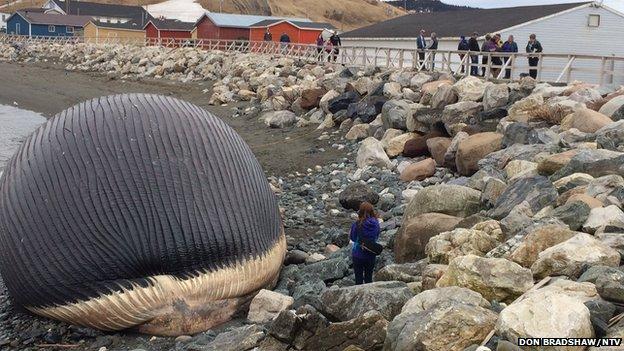A stinky, dead whale has become a tourist attraction in a Canadian town
Dead blue whale in Trout River, Newfoundland.
A 180-ton blue whale carcass washed up in the small Newfoundland town of Trout River last week. It's believed the whale was one of nine endangered blue whales that died in heavy ice off Canada's Atlantic coast several weeks ago.
Doris Sheppard runs the Sheppard's B & B in Trout River, and noticed the whale as she and her husband were driving home.
"We noticed this black thing out on the ice. That was Easter morning. And the next morning the ice had brought that into our cove. Now the ice has melted, but it didn’t take the whale with it. It left it grounded on the beach."
And that could mean a big, stinky problem.
"Up until yesterday, I could not smell anything," Sheppard said. "But last night the smell was awful."
The smell is because the carcass is bloated with methane gas, caused by decomposition. If the whale's body becomes too stressed, it could actually explode, spewing whale guts all over the beach. But local and federal authorities disagree over who is responsible for the whale's disposal.
"We are a small town of a little over 600 people," Sheppard said. "We have a small tax base. We don’t have the resources to deal with this. We don’t have the experience to deal with this. There are suggestions coming in, but to leave it there just to decay on the beach, if it was a fast process we could probably deal with it. But this takes time."
Jack Lawson, a fisheries scientist with the Department of Fisheries and Oceans told the CBC that it's important for people not to touch the rotting carcasses because there are viruses and bacteria carried by whales that can be transferred by touch.
"Right now, we have local children being curious, they want to touch it," Sheppard said. "They have been climbing on top of it and getting their picture taken. If it breaks open and they fall through, we’re in a tight spot here."
But with tourism season fast approaching, residents like Sheppard are concerned about the impact a decaying whale could have on businesses.
"It was obviously a beautiful mammal. It’s too bad it had to die in the ice. I would prefer that we had a live one out there and that would be a tourist attraction. This is much harder to deal with," she added.
A 180-ton blue whale carcass washed up in the small Newfoundland town of Trout River last week. It's believed the whale was one of nine endangered blue whales that died in heavy ice off Canada's Atlantic coast several weeks ago.
Doris Sheppard runs the Sheppard's B & B in Trout River, and noticed the whale as she and her husband were driving home.
"We noticed this black thing out on the ice. That was Easter morning. And the next morning the ice had brought that into our cove. Now the ice has melted, but it didn’t take the whale with it. It left it grounded on the beach."
And that could mean a big, stinky problem.
"Up until yesterday, I could not smell anything," Sheppard said. "But last night the smell was awful."
The smell is because the carcass is bloated with methane gas, caused by decomposition. If the whale's body becomes too stressed, it could actually explode, spewing whale guts all over the beach. But local and federal authorities disagree over who is responsible for the whale's disposal.
"We are a small town of a little over 600 people," Sheppard said. "We have a small tax base. We don’t have the resources to deal with this. We don’t have the experience to deal with this. There are suggestions coming in, but to leave it there just to decay on the beach, if it was a fast process we could probably deal with it. But this takes time."
Jack Lawson, a fisheries scientist with the Department of Fisheries and Oceans told the CBC that it's important for people not to touch the rotting carcasses because there are viruses and bacteria carried by whales that can be transferred by touch.
"Right now, we have local children being curious, they want to touch it," Sheppard said. "They have been climbing on top of it and getting their picture taken. If it breaks open and they fall through, we’re in a tight spot here."
But with tourism season fast approaching, residents like Sheppard are concerned about the impact a decaying whale could have on businesses.
"It was obviously a beautiful mammal. It’s too bad it had to die in the ice. I would prefer that we had a live one out there and that would be a tourist attraction. This is much harder to deal with," she added.
